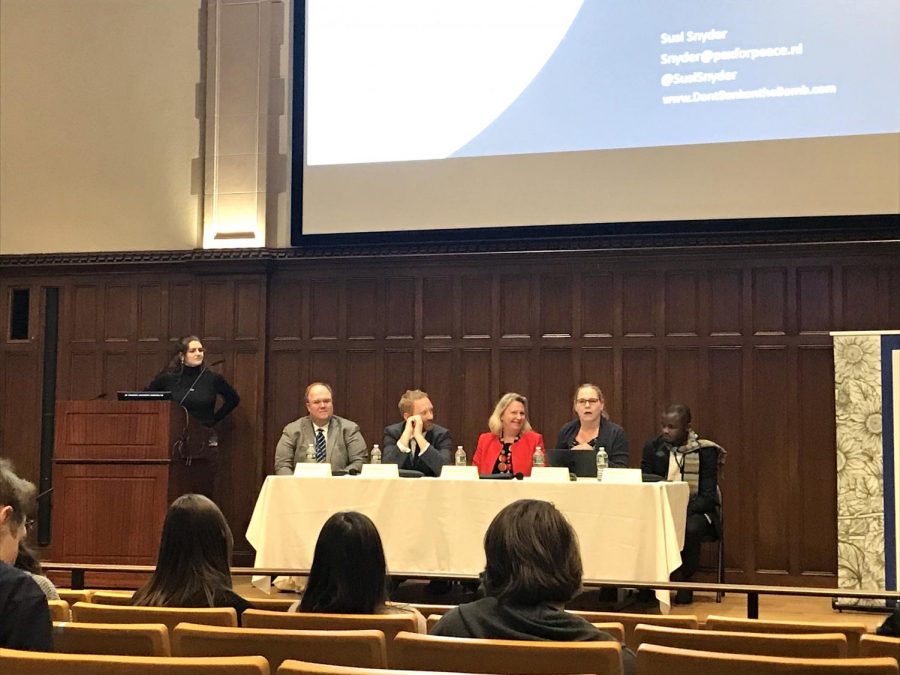Humanitarian Student Union Holds Panel on Peace and Nuclear Weapons
Fordham’s Humanitarian Student Union (HSU) hosted a panel to address the presence of nuclear weapons and what effect they have on peace in the contemporary world.
Fordham’s Humanitarian Student Union (HSU) hosted a panel on Thursday, Oct. 17, in conjunction with the Nuclear Age Peace Foundation, to address the presence of nuclear weapons and what effect they have on peace in the contemporary world.
The panel included four representatives, each from different organizations, that provided varying perspectives on the issue: Jamie Walsh of the Permanent Mission of Ireland to the United Nations, Veronique Christory of the International Committee of the Red Cross, Susi Snyder of the peace organization PAX and David Onazi, Ph.D., of the International Physicians for the Prevention of Nuclear War and the International Campaign to Abolish Nuclear Weapons.
“We are so grateful to our incredible speakers for traveling from a full day of meetings at the UN to share their knowledge and experience with us. In today’s climate, we are so normalized to nuclear weapons that it’s hard to imagine that there is anything we could do to prevent their production or use,” stated Emma Budd, FCRH ’20, HSU president at Rose Hill.
Representatives spoke on how the use of these weapons affects all of humanity and contributes significantly to climate change.
“The unrestricted use of these weapons aids human abuses and restricts development,” Walsh said.
Rosie McCormack, HSU vice president at Rose Hill, FCRH ’20, said that the concept of “nuclear deterrence,” the buildup of weapons to deter other nations from using their own, does not make sense.
“In a world where you can disable an enemy through a cyber or technological attack, what is the incentive to build up expensive and lethal weapons that put infrastructure and innocent civilians at risk?” she said. “Confronting the assumptions we are raised with is so important because it’s the key to thinking outside the box to building a more peaceful, innovative global community.”
Budd said the event and its speakers reminded all of the attendees of the severity of the issue.
“I think Veronique Christory from the ICRC did very well, reminding us all that there is no humanitarian organization that could effectively aid the kind of crisis that would ensue if a nuclear weapon were used,” she said.
Panelists agreed that the only way to solve this problem is to act collectively.
Onazi highlighted a quote by Albert Einstein for this imperative, stating, “Those who have the privilege to know, have the duty to act.”
Currently, the UN is working towards a Treaty on the Prohibition of Nuclear Weapons, but it requires 50 countries to make the prohibition a national law before it can become international law. The agreement was open for signatures in September 2017, but as of Oct. 1, only 33 countries have signed.
However, Snyder said that in order for companies to create these weapons, banks must fund their creation. One of the easiest and most effective ways to take part in decreasing nuclear weapons is to express concern to banks.
“Complaining to banks is a way to express your power,” she said.
Snyder said that in order for this mission to be successful, the money needs to shift from one that builds destruction to one that disarms – all efforts, no matter how small, can make a big impact.
“If enough people complain to a bank about funding nuclear weapons [facilities], then the bank can cut funding,” she said. “If the treaty comes to fruition it can cause all countries to ban weapons, even if those countries did not ratify it themselves.”
Budd said that she hopes the event communicated that no matter how intangible the crisis of nuclear weapons may seem, individuals have the power to take action.
“Do your research, call your banks, find out where your money is being invested — and if it is funding nuclear weapon production, then you have the power to do something to stop it,” she said.











































































































































































































Seth • Oct 30, 2019 at 3:44 pm
Just a small correction on this otherwise great piece: please note that 79 countries have signed the Treaty on the Prohibition of Nuclear Weapons, not 33. (The 33 number is how many have ratified the treaty – ratification is a slower process that often requires legislative action.) Overall, approximately 135 countries have indicated their support for the treaty, calling on all nations to sign and ratify — that’s 2/3 of the world!